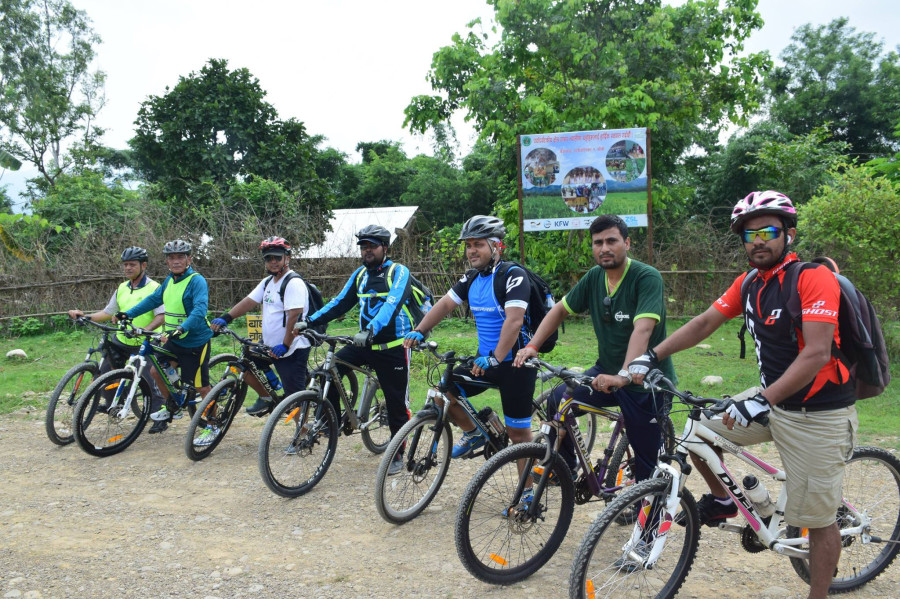Money
Homestay operators turn to farming after tourism evaporates
The pandemic has wiped out small businesses which are the backbone of the country’s economy.
Madhu Shahi
In September last year, homestay owners like Ganga Dutta Jaisi in Gabhar Valley, Banke were riding the crest of a tourist boom.
They were hosting more than 500 foreign and domestic visitors daily, and business was going great. Gabhar Valley in south-western Nepal is a popular stop for sightseers bound for various destinations in the far west.
The growing visitor numbers had encouraged homestay owners to upgrade the facilities, and they launched expansion plans by borrowing funds.
Covid-19 dealt them a cruel blow. Arrivals evaporated following the lockdowns and restrictions; and saddled with heavy debts, homestay owners face certain ruin.
Many of them are abandoning the hospitality business and getting involved in the tried and trusted occupation—farming.
The pandemic has wiped out small businesses which are the backbone of the country’s economy.
“I borrowed Rs2 million from a bank and invested it in my homestay,” said Jaisi, whose place lies in an area surrounded by the Chure hills, around 23 km from Nepalgunj.
“As business was better than I had expected, I thought I would easily repay the loan,” the 50-year-old entrepreneur said.
He still owes Rs500,000 to his bank, and does not know how he is going to repay the loan as the tourism business does not look like rebounding anytime soon. “It has been five months since I earned a penny.”
Jaisi has stopped waiting for tourists to come back. He has switched to farming to scrape together a livelihood. He bought 30 goats recently and plans to rear buffaloes and chickens too. He has leased 3 bighas of land and has started tomato farming.
All nine members of his family help him run the farm. He believes he can link his homestay with his farm, and market it as agro tourism when the situation becomes normal one day.
Most of the homestay operators of Gabhar Valley have switched to agriculture and livestock rearing. Homestays in the Gabhar Valley, mostly operated by members of the Tharu community living near Banke National Park, have been serving tourists for the last seven years.
Gabhar Valley has gained popularity as a resting centre for tourists visiting Rara, Khaptad, Dhangadhi, Kanchanpur, Bardia National Park and other places in the far west. There are 17 homestays here.
Karna Raj Rokaya, another homestay entrepreneur, entered the business recently after seeing demand for such hospitality increasing.
Living in a Nepali village and observing traditional cultural activities of locals is the major attraction of the homestay scheme. It started to rise in 2011 when Nepal organised the second Nepal Tourism Year campaign.
According to a Nepal Rastra Bank study, the rise in homestay activities has increased sales of local agro products in the village, benefiting the entire community. The study shows that with an annual earning of Rs2.39 million, the income-to-investment ratio for homestay households is 2.35 times.
There are more than 800 private homestays including community-based homestays in the country, the Nepal Homestay Association said,
Rokaya said he entered the homestay business two years ago as he saw good prospects. He even left his job at the Forest Division Office to start his venture.
“Now, with no business, I am worried how to repay the interest and instalment payments which come to Rs22,000 a month. "Income is zero. I am thinking of doing vegetable farming," he said.
The story is similar at New Village Homestay in Rapti Sonari Municipality. Most of the small entrepreneurs have started poultry and vegetable farming.
Nanikala Jaisi, who has been operating a homestay for the last two years, said that she also went into vegetable farming to make some money. "Until six months ago, I was busy welcoming guests to my home. But now, everything is gone. I have started vegetable farming."
She had borrowed Rs700,000 to operate a homestay in two rooms. Her husband, who works in India, has returned home because of the pandemic. Her five family members are now growing vegetables.
According to Mangal Chaudhary, secretary of the Homestay Association in Banke, small entrepreneurs have been switching their occupation for survival due to the impact created by the pandemic.
Krishna Lal Chaudhary, president of the Gabhar Valley Community Homestay and also the secretary at the Homestay Association of Nepal, is optimistic that things will turn around and the homestay business will make a comeback after the outbreak ends.
He said that after the situation returns to normal, homestay operators will have an opportunity to link their businesses with agro tourism as they are now engaged in farming. A few communities have already started lemon farms in the Gabhar Valley.
“About Rs2 million has been already spent on the scheme,” said Chaudhary. “The pandemic has taught us to prepare alternatives and turn challenges into opportunities.”
Chaudhary himself has started livestock farming and is rearing 400 chickens as his homestay business makes no money. “I don’t know when the situation will become normal, but at least I have options.”




 14.12°C Kathmandu
14.12°C Kathmandu














